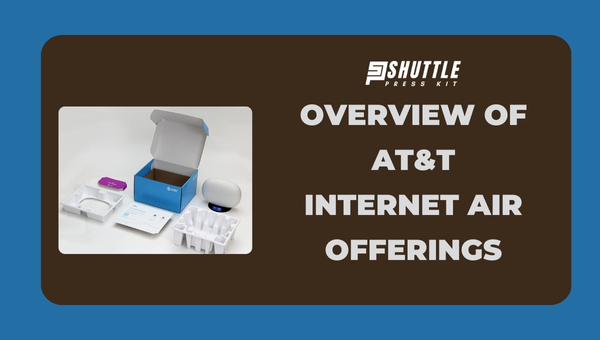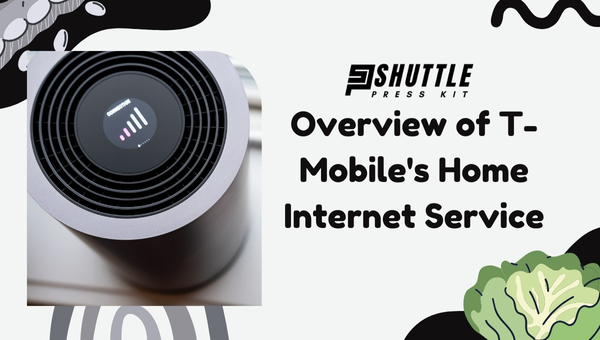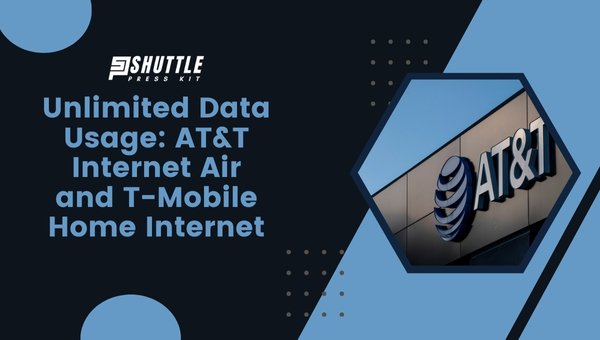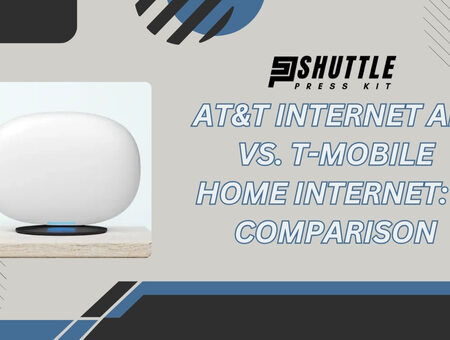Choosing between AT&T Internet Air and T-Mobile Home Internet can be a tricky task. With both companies being giants in the ISP market, it is essential to compare their features, installation process, speed, reliability, customer service, and prices to make an informed decision.
This comparison aims to cut through the marketing hype and give you an unbiased view of both services. We will delve deep into their offerings and check out experiences from real users so that you can easily determine which one fits your needs better. Prepare for a deep dive into AT&T Internet Air vs. T-Mobile Home Internet!
Overview of AT&T Internet Air Offerings
AT&T presents a singular, streamlined approach to providing high-speed internet with its Internet Air plan. Designed to utilize the efficiency and expansiveness of AT&T’s network,

Internet Air aims to cater to a wide range of consumer needs, offering substantial speeds that can comfortably support single users up through small households. Here’s what sets AT&T Internet Air apart:
- Simple Pricing Structure: AT&T has established a straightforward monthly cost for Internet Air, ensuring users can access their services without encountering complicated fee schedules or hidden costs.
- Unlimited Data: All subscribers to the Internet Air plan enjoy the benefit of unlimited data usage, eliminating concerns over caps or additional charges based on consumption.
- Discounts for AT&T Cell Subscribers: A notable perk is available for existing AT&T cell service customers. Qualifying cell plans unlock a significant discount on the monthly rate for Internet Air.
Also Read: Low Capacity vs High Capacity Starlink: Optimize Your Choices
Overview of T-Mobile’s Home Internet Service
T-Mobile’s Home Internet service offers a straightforward, yet efficient solution for those seeking high-speed internet connectivity without the complexity of multiple plan options. By providing a single unlimited data plan utilizing both 5G and 4G LTE networks, depending on availability, T-Mobile caters to a wide range of internet needs from casual browsing to high-demand streaming and gaming. Here’s an overview of what you need to know:

- Fixed Monthly Rate: For $60 per month, customers can enjoy unlimited data through T-Mobile’s Home Internet service. This plan is designed to cater to all your internet needs without worrying about data caps.
- Speeds Suitable for Various Needs: Depending on the local network infrastructure (either 5G or 4G LTE), users can experience download speeds ranging between 72–245Mbps. Such speed variability ensures that most online activities can be performed seamlessly.
- No Additional Equipment Cost: Unlike many other providers that charge extra for necessary hardware, T-Mobile includes all required equipment in the monthly fee without additional charges.
By offering this mix of benefits along with its expanding network coverage, T.Mobile’s Home Internet services stand out as an appealing choice for households looking for simplicity in their internet access solutions with no hidden fees or complicated packages.
Unlimited Data Usage: AT&T Internet Air and T-Mobile Home Internet
Both AT&T Internet Air and T-Mobile Home Internet offer the luxury of unlimited data to their subscribers, ensuring users can enjoy continuous streaming, gaming, and downloading without the fear of exhausting their data allowance. This removes the worry of incurring extra charges for exceeding a data cap, a common concern with many internet service providers. The promise of truly unlimited data access sets both companies apart in a market where “unlimited” often comes with numerous restrictions.

Despite this generous offering, subscribers need to note that there’s a policy to monitor misuse or excessive consumption. While both AT&T and T-Mobile advertise truly unrestricted usage, they reserve the right to throttle or suspend services if usage patterns are deemed abnormal—such as consuming an extraordinary amount of data in a brief period. This measure is in place to safeguard the network quality for all users but is unlikely to affect the average consumer who uses their internet within reasonable bounds.
Comparing Costs: AT&T Internet Air and T-Mobile Home Internet
When comparing the pricing structures of AT&T Internet Air and T-Mobile Home Internet, several key aspects must be considered to make an informed decision. AT&T’s solution, known for its broad connectivity options, often comes with various plans that cater to different needs.
These can range from more affordable options aimed at moderate internet users to premium packages designed for heavy streaming and gaming. On the other hand, T-Mobile Home Internet typically adopts a straightforward approach, offering a single pricing model that appeals to customers looking for simplicity and value. This method aims to provide unlimited data without the complexity of tiered service levels.
| Price | Price w/ qualifying cell plan | Data | Download Speed | |
|---|---|---|---|---|
| AT&T Internet Air | $55.00/mo. | $35.00/mo. | Unlimited | 75-225 Mbps |
| T-Mobile Home Internet | $60.00/mo. | $40.00 – $50.00/mo. | Unlimited | 72-245 Mbps |
In addition to monthly fees, potential hidden costs such as equipment rental, installation fees, and any applicable taxes or additional charges should be scrutinized. AT&T may offer promotional rates or bundle discounts that significantly reduce initial costs but could change after a promotional period ends.
Meanwhile, T-Mobile’s pricing strategy often includes taxes and fees in its advertised rate, providing clearer upfront costs but potentially less flexibility than some competitors. Ultimately, comparing these services requires looking beyond just the monthly rate to understand the total cost of ownership over time and any contractual obligations that might affect long-term satisfaction and affordability.
Pros & Cons Of AT&T Internet Air
| Pros | Cons |
|---|---|
| 1. Wide Coverage Potential: Leverages existing power lines, reducing the need for new infrastructure. | 1. Technological Uncertainty: As a relatively new concept, its real-world challenges and limitations are still being evaluated. |
| 2. High-Speed Internet: Promises to deliver gigabit internet speeds comparable to fiber-optic networks. | 3. Cost-Effective Deployment: This could be more affordable than laying new fiber cables, especially in rural or hard-to-reach areas. |
| 5 . Long-Term Durability: Questions remain about how environmental factors might impact the longevity and maintenance needs of AirGig systems installed on electrical poles. | 3. Investment and Cost Recovery: Initial deployment might be costly, affecting pricing and accessibility for end users. |
| 4. Innovative Use of Existing Infrastructure: Smart integration into the existing electrical grid without major disruptions. | 5 . Easier Expansion in Rural Areas: Provides an effective solution for bridging the digital divide by offering high-speed internet in underserved regions. |
| 5 .Easier Expansion in Rural Areas: Provides an effective solution for bridging the digital divide by offering high-speed internet in underserved regions. | 4. Interference Concerns: There are potential issues with interference that could affect the reliability and performance of the internet service. |
Pros & Cons Of T-Mobile Home Internet
| Pros | Cons |
|---|---|
| No Annual Contracts: Flexible service without long-term commitments. | Coverage Variability: Service quality depends on T-Mobile’s network coverage in your area. |
| Simple Pricing: Straightforward, no hidden fees pricing structure. | Dependent on Cellular Congestion: Speeds may vary due to network demand especially during peak times. |
| High Speeds Available: Capable of delivering fast internet speeds suitable for streaming and gaming in areas with good coverage. | Hardware Limitations: Limited to using the provided gateway device, which may not have all the features of more advanced routers. |
| Unlimited Data: No data caps offering unlimited internet usage without overage charges. | Inconsistent Speeds: Some users report inconsistent speeds, which may impact experience during crucial tasks like video conferencing or online gaming. |
| Easy Setup: Generally easy and quick to set up; plug-and-play installation without needing a professional technician visit in most cases. | Prioritization Issues: As with any mobile network, traffic prioritization could affect speed during high usage periods even if technically “unthrottled.” |
| Limited Availability: While expanding, it’s still not available in all locations especially rural or underserved areas where it’s needed most. |
Also Read: Starlink Volcano Mount Guide: Easy DIY Installation Tips
FAQs
Which service offers better speed – AT&T’s internet air or T-mobile’s home internet?
Both offer comparable speeds; AT&T Internet Air provides speeds between 75 to 225Mbps, while T-Mobile Home Internet gives around 72 to 245Mbps.
Despite higher costs; why some people choose one over another?
People usually base their choice on factors like the quality of customer service, reliability of the connection, and the actual internet speed in their location.
What are some common issues reported by users about these internet providers?
Common complaints often include occasional downtime, varying actual speeds compared to what is promised, and sometimes challenges with customer service.
What are alternatives to these services if I am not satisfied with either?
There are several other competitive choices such as Verizon Fios, Xfinity by Comcast, or HughesNet depending on your geographical location.
Can I transfer my services if I move to a different location?
Yes, both AT&T Internet Air and T-Mobile Home Internet allow service transferability but it depends on whether your new location has coverage under these providers.
Also Read: Starlink Offer Phone Service? Discover Now!
Conclusion
the choice between AT&T Internet Air and T-Mobile Home Internet comes down to individual needs, preferences, and circumstances. Both providers offer robust packages with their own unique selling points.
If higher speed is your priority and you’re willing to pay a bit more for it, T-Mobile would be your best bet; but on the other hand, if you value stability over speed and want more affordability then AT&T should be your go-to.
Always remember to consider what’s important for you — cost-efficiency, customer service effectiveness, or installation simplicity before making a decision.
Review each package comprehensively considering all facets including price breakdowns, data limitations (if any), download speeds, etc., before subscribing. Also, keep in mind that these services might vary depending on area so always double-check service availability in your location.
